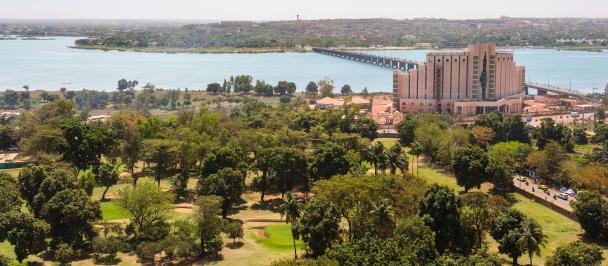Sustaining Development in West and Central Africa
April 26, 2024

Somone, Senegal 🇸🇳
As we entered 2023, the world was filled with echoes of optimism, a sentiment shared by many at the start of any new year. Yet, the global landscape we navigate today has dramatically shifted. Global solidarity is seemingly waning, geopolitics are in heavy flux, traditional power structures are being questioned, and new voices are emerging from corners once silent. Our world is interacting, innovating, and even conflicting in unprecedented ways.
In West and Central Africa, we saw a familiar face on the ascendency once more, one with footprints all over recent history. The complex situation of unconstitutional transitions and the development disruption it leaves behind have placed us at a time when the past and the present are in conflict with each other.
The events in Niger, Gabon, Guinea, Mali, and Burkina Faso, among others, aren’t merely isolated events. They signify a deeper, more seismic shift in the political and developmental fabric of the region, reflecting a growing desire among these countries for a new direction and renewed governance.
Amidst this complex context, UNDP found itself in an intricate web of both challenge and opportunity. Our support is now more crucial than ever, and the implementation of our mandate faces increasing complexities.Njoya Tikum, Director, UNDP Sub-Regional Hub for West and Central Africa and Resident Representative, UNDP Senegal
Throughout 2023, in collaboration with our technical and financial partners, we launched several initiatives aimed at fostering development through policy support and direct interventions. Our efforts in governance and peacebuilding have significantly enhanced social cohesion, resilience, and good governance while addressing economic disparities amid intricate security, environmental, political, and socio-economic challenges.
For instance, through our governance portfolio, we partnered with the West African Economic and Monetary Union (WAEMU) to assess the current state of corruption and illicit financial flows in Africa, offering solid recommendations to address these issues. Through the Regional Stabilization Facility, our collaborative efforts have helped reach close to 1.7 million people, more than half of whom were women, significantly contributing to the stabilization and recovery of target areas affected by violent extremism. Our efforts in building and rehabilitating essential infrastructure, enhancing security, and supporting local economies underscore our holistic approach to stabilization and long-term development.
Significant milestones were also achieved in our youth portfolio, where we launched a new cybersecurity workstream in collaboration with Give1 Project. The initiative, focused on enhancing the digital skills and cybersecurity knowledge of young people in the region and opening new avenues for economic participation and innovation, built a network of 8,611 cybersecurity enthusiasts, including 24 youth who benefited from a three-month training programme in preparation for the internationally recognized CompTIA Certification in Cybersecurity.
Additionally, our efforts extended to climate security and resilience, where we convened over 150 stakeholders for the first-ever Sahel Climate, Peace and Security Forum. Here, the landmark Bamako Declaration was adopted, outlining the commitment of Sahelian countries to advancing climate, peace and security in the region. Through the Sahel Resilience Project, we reached 1,851 people with Disaster Risk Reduction and Climate Adaptation activities, empowering regional institutions and national governments to adopt risk-informed development planning and investments. Our efforts also culminated in the development of the Sahel Integrated Risk Information Platform and the Framework for Multi-Hazard Early Warning and Early Action System for Africa, which help strengthen policy frameworks, harmonize data collection tools and support decision-making in disaster risk management and planning across the region.
These efforts were supported throughout the year by the remarkable dedication of 3,052 UN Volunteers, who, through their diverse expertise and commitment, played a pivotal role in our interventions, reaching nearly 685,000 people across the region.
The lessons and milestones recorded over the past year provide a solid foundation for 2024, and together with our partners, we are committed to deepening our impact and embracing bold aspirations that seek out the greatest benefit for millions across the region.
Join us!
Read our Annual Report: UNDP WACA | Annual Report 2023
Stay connected to our work and connect with us on any of the following platforms:
X (Formerly Twitter), Facebook, Instagram, YouTube, and LinkedIn.

 Locations
Locations



